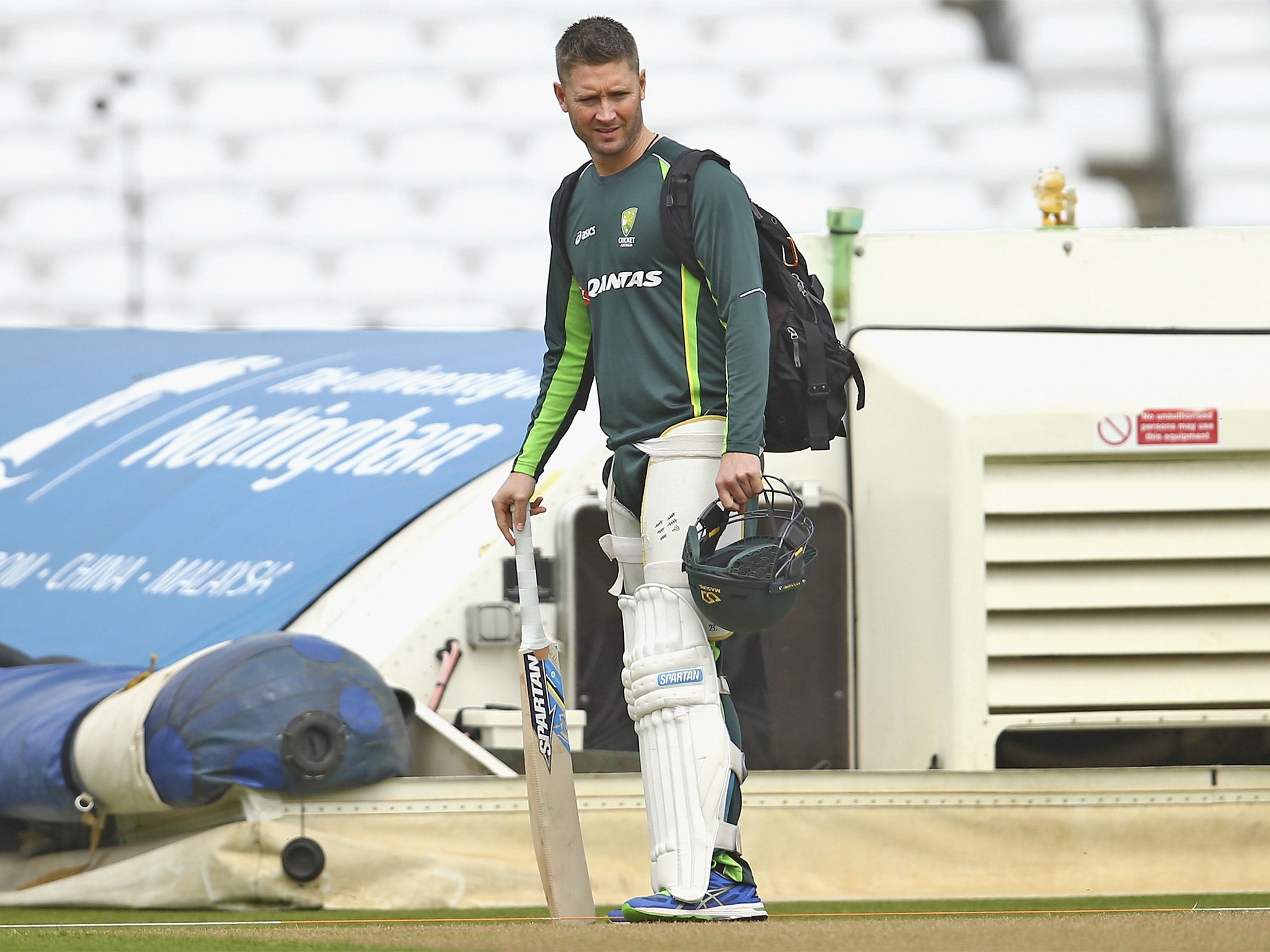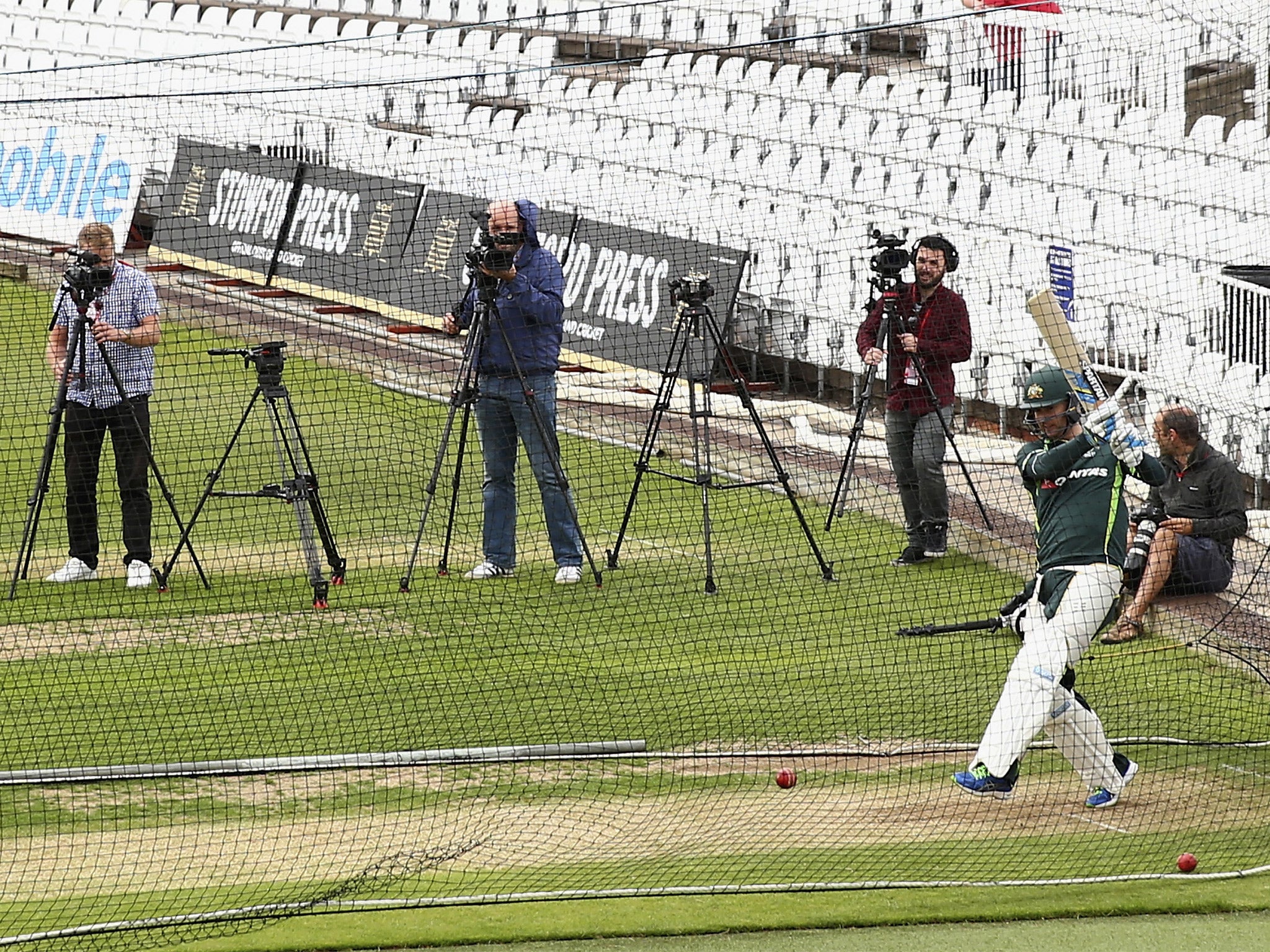Ashes 2015: Michael Clarke feels the oppressive weight of history
Out-of-form captain is determined not to become first Australian since the 19th century to lose four Ashes series

Your support helps us to tell the story
From reproductive rights to climate change to Big Tech, The Independent is on the ground when the story is developing. Whether it's investigating the financials of Elon Musk's pro-Trump PAC or producing our latest documentary, 'The A Word', which shines a light on the American women fighting for reproductive rights, we know how important it is to parse out the facts from the messaging.
At such a critical moment in US history, we need reporters on the ground. Your donation allows us to keep sending journalists to speak to both sides of the story.
The Independent is trusted by Americans across the entire political spectrum. And unlike many other quality news outlets, we choose not to lock Americans out of our reporting and analysis with paywalls. We believe quality journalism should be available to everyone, paid for by those who can afford it.
Your support makes all the difference.Even from the sanctuary of a final net session, there was a reminder for Michael Clarke of just how heavily history now weighs.
He was taking throw-downs from the batting coach Michael Di Venuto – the one-time Tasmanian run-machine – when he found himself approached by an 81-year-old Englishman, John Pick, who wanted to tell him that he had watched Don Bradman bat here at Trent Bridge, in the first Test of the 1948 Ashes summer.
“How did he go, 200, 300? How many did he make?” Clarke asked, with incredibly good grace, as his interlocutor helped prod a ball under the net and back within his reach. There was an inevitability about the answer – 138 – and yet Clarke took it in good heart. “Thanks for your support,” he told the octogenarian before returning to his net.
It was the picture of a cricketer attempting to retain a sense of normality in the hope that the old, familiar routines of century compilation will somehow be restored to him, in time to stave off the ignominy of becoming the first Australian since the 19th century to have lost four Ashes series. Beginning practice half an hour before the rest of the squad – his habit since the catastrophe of Edgbaston – is actually nothing new to him. Matthew Hayden will tell you Clarke has always been that way inclined.
It was also the picture of a man desperate for just a few balls more – and then some more – as he pursued that run-making elixir which took him to an average of 52.97 at his 2013 peak and now languishes at 28.07 across the course of the past 12 months. “All yours Pete…” Clarke said, as the wicketkeeper Peter Nevill waited his turn to bat. “Actually, I’ll just get 10 more…”
The groundstaff were clanking around, putting up crash barriers, by the time Clarke walked away, having cut, pulled and driven to perfection. (Michael Vaughan will tell you all about being the finest net batsman in history, when no runs are flowing out on the square.) There was, however, no disguising how dog-tired Clarke looked when he arrived – late – to discuss the events of the days up ahead.
They could represent the final knockings of the 34-year-old’s time in a baggy green if Australia cannot prevail and Clarke cannot find a way beyond the 365 he has mustered from 15 innings. He has achieved just one score above 50 in 12 months – the 128 in the first Test of the home series with India – and the century board in the Trent Bridge pavilion underlines the ominous task of breaking that chain on a seaming surface such as this.
They have not engraved an Australian name on that board since David Boon went up, 22 years ago. In only two Tests since David Gower’s England achieved their rather under-appreciated Ashes victory 30 years back, in 1985, have Australians been added.
Clarke’s discussion of the fourth Test was painfully brief, seven minutes, and the mood out on the pitch – Australia going through their work with quiet purpose – was equally lacking in animation. It doesn’t help that the captain conveys a perpetual sense of irritation with the fact that a role in the team selection has been removed from him. “I haven’t got a side from the selectors yet,” was his latest on this theme. “I will speak to [selectors] Rod [Marsh] and Darren [Lehmann] today and hopefully they will give me that XI sooner rather than later.”

It seems Australia may stick with the side which lost so calamitously in Birmingham, with the batting line-up thought more likely to be tinkered with than the bowling options. Shaun Marsh may conceivably come in for his brother, Mitchell. The stiffness Adam Voges felt in his neck on Tuesday morning does not seem like an excuse for exclusion.
More significant than selectors or selection is how Clarke can find the form for a middle order which is crying out for his ballast. He suggested that he has been trying new ideas out since Birmingham. “I don’t think this is probably the right forum to talk about it,” he observed.
He has also been thinking of batting at No 5 rather than at four, though that call has been contingent on the XI he has been given.
But time in the middle is where lost secrets to batting success – an ability to pick the ball up quickly, see it cleanly through all the movements, establish a rhythm – are truly to be found.
“You’ve just got to create that breakthrough innings that takes a bit of extra time, where you grind it out and get the result on the back of it,” was how Hayden put it this week and there are far easier places to do so than this ground, and this country.
It was Nick Knight in The Independent who perhaps best expressed the challenge: “English batsmen grow up learning to be suspicious of the ball” in a way that Australians simply don’t.
The psychologists say that fear can play no useful part in sport, though it may ultimately be the factor which weighs for Australia and their captain, as they seek again to shift the balance of a series in which we still wait for a side to display the collective desire to wrest control away from the opposition which dominates the first day.
“I think there’s no doubt that this is my last opportunity to win an Ashes series in England, for me personally and a number of the guys,” Clarke said, in a heartfelt sentiment at long last. “But again, all you can do is give your best, you know. If you get beaten you get beaten, but I can guarantee you we are going to have a red-hot crack, that’s for sure.”
Beaten? His forebears would not even have contemplated a word such as that, let alone articulated it in plain view. On the wall above Clarke’s head was an old Nottinghamshire CCC watercolour portrait. It is entitled: Playing out Time in Difficult Light.
He can only hope that it is not his epitaph.
Join our commenting forum
Join thought-provoking conversations, follow other Independent readers and see their replies
Comments